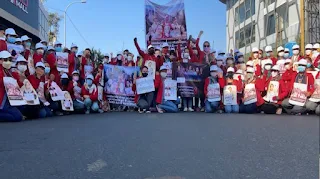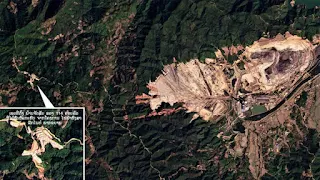The government bans tobacco products for those born after 2005
The government plans to ban tobacco products to future generations by banning the sale of cigarettes and tobacco products to those born after 2005, according to a report.
A report from health-related news site CodeBlue yesterday said this means 17-year-olds today will not be able to buy the product legally when they reach a certain age to smoke next year.
"We, like in several other Western Pacific countries, hope to pass the law this year, which will bring an end to the smoking generation by banning the sale of tobacco and other cigarette products to anyone born after 2005," the Health Minister said. , Khairy Jamaluddin was quoted as saying.
He was also reported to have said so at the 150th session of the World Health Organization Executive Board Meeting in Geneva.
"Malaysia feels this will have a huge impact in preventing and controlling NCDs (non -communicable diseases)," he said.
The report states that there are more than 27,200 smoking -related deaths reported in Malaysia every year.
In comparison, there were 31,058 Covid-19 deaths confirmed last year, making it the most likely leading cause of death in 2021.
Meanwhile, according to CodeBlue, Khairy had earlier said he would table the latest Tobacco and Smoking Control Act in the next meeting of Parliament, which would replace the existing tobacco control law under the Food Act 1983.
The new law will also regulate e-cigarettes and vape products.
A generation-based smoking ban will be similar to New Zealand’s plan to raise the legal age of smoking by one year, every year, starting in 2027-which essentially ensures tobacco products are banned to those born after 2008.
AI criticizes international for slow action on Burma
Amnesty International (AI) issued a statement today criticizing the delay in international action on Burma.
Amnesty International says the human rights crisis will only get worse if the international community continues to delay serious international human rights abuses, including deadly violence that has seen protesters in Burma over the past year.
"It will be a year since the coup," he said. The military has now carried out indiscriminate airstrikes that have killed scores of civilians in the southeast of the country and blocked live aid. Journalists and activists were detained, and bloodshed ensued in prisons. Many countries around the world are unaware of these atrocities, as they have done with the worst human rights abuses against the Rohingya. As a result, the military is enjoying impunity and is stepping up its crackdown on anyone who goes against its orders, ” said Ming Yu Hah, AI's deputy regional director.
The Security Council requested that in addition to the International Atomic Energy Agency's ongoing inspections in Iran, that it monitor Iran's compliance with "the steps required by the IAEA Board". AI says sanctions should be handed over to the International Court of Justice instead of targeting military leaders.
In addition, Asean must deal with Burma in a united manner and call on the military to immediately end violence against civilians. AI said ASEAN should work with the military to put pressure on the five agreements to end with a clear timeline for implementation and a ban on humanitarian aid.
Passenger vans banned in Kalemyo
Passenger vans have been banned from operating in Kalemyo, Sagaing Division, since January 26 due to an increase in the number of Kovis infected.
On January 26, 18 passengers departing from Kalemyo were found to have been infected with the coronavirus, and a date for its reopening is unknown, said a member of the Kalemyo-Rangoon-Mandalay bus service.
"I was told yesterday at around 3pm that traffic would be closed through Ma Tha Tha. It was a big deal.
Passengers say the closure makes it difficult for those who have been diagnosed with Kovis to return home.
More than 1,000 people have died in Kalemyo since 2021, and residents in Kalemyo say they need to abide by the Kovis rules because of fears of an epidemic.
NagaWorld workers continue to demand that authorities release eight union representatives
Workers continue strike to demand release of eight union representatives and expedite settlement of labor dispute with NagaWorld Casino . Photo taken
NagaWorld workers have been on strike on National Assembly Road near the Australian Embassy for 41 days. They demanded that the authorities release eight union representatives and expedite the settlement of labor disputes with the company.
Casino worker Vuth Linda says the solution the workers want now is to release eight workers' representatives unconditionally and move on. Negotiations are not about the payment of severance pay at the Ministry of Labor, because this is a joint labor dispute.
The strikers will continue to protest peacefully until the authorities release their representatives and the company has to accept the remaining 300 workers. Let people go back to work.
As for the officials of the Ministry of Labor, they continue to record audio recordings of the letter of the Ministry inviting the strikers or workers' representatives to negotiate the conditions. Some do not agree.
Minister of Interior Sar Kheng recently called on all parties to resolve labor disputes at NagaWorld peacefully. He asked the Ministry of Labor and all relevant authorities to be patient and mediate this case as soon as possible.
Civil society groups and unions have called on the court to drop the charges and release the eight union leaders and activists. Freedom. At the same time, the Ministry of Labor and the company continue to resolve this labor dispute by opening up labor rights and recognizing the presence of unions in place. Repeat.
Note to commenters on this article: In order to maintain our dignity, we will only post comments that are not offensive. Only others.
The victims of the power plant will receive housing
Satellite imagery taken on January 26, 2022, showing the location of the Hongsa Lignite Coal Power Plant. The thumbnails show the location of the affected villages of the Hongsa Lignite Extension Project, just 12 km west of the power plant near Ban Pang Bong.
The 114 families in Kien Ngiu village, Xayaburi province, who have been affected by the loss of their land and houses, have been relocated due to the Hongsa Lignite power plant's expansion of their concessions.
As one of the affected villagers told RFE / RL on January 27:
" It's good and bad, but he did it and needed to go with him. It's not good to talk about it. Land, if not given, there is no land for farming and gardening. ”
The villager added that the houses he built were of the same shape and size, some of the old houses had bigger houses and some had two-story houses. Another affected person said the same day that the evacuation would begin. Some families say very nice. Some families are not so pretty. But the villagers are most upset that the relevant parties have not yet cleared and allocated agricultural land.
" It's nice to give him some, but he's not feeling well. ”
And another villager who was also affected said the house was large enough to live in, not a big house. But it's better than the old house. But the problem is that the villagers need land to be replaced as soon as possible because they want to farm and raise livestock. If the replacement is delayed, the villagers will lose time and opportunity to produce directly. For some families who have received compensation in the past, they have gone to buy land to grow rice because it is not clear when the financial authorities and the company that owns the power plant will clear the land and allocate compensation to the villagers.
As another affected villager told RFE / RL on January 27:
" He pioneered, but he said this. He said that there is a point, but he reported at this meeting that the organization has come down to see for sure, but now we do not see any point, we have not seen yet. ”
An official from Muang Ngeun told RFA the same day that preparations were under way to evacuate 114 families to the resettlement facility, which will begin on February 1 and is expected to be completed by the middle of this month. Compensation will then be given to the remaining villagers. Land clearing and land allocation for villagers is still difficult because it is not yet known where to find land for their paddy fields.
“ After the grassland was relocated, the farm allocated land for him to produce again. City officials have not yet determined which area to give him. The
construction of 136 resettlement houses for the people of Kiew Ngio village has been completed with a handover ceremony at the resettlement office on January 26. In the village there is electricity, running water, roads, health centers, schools, markets.
To find out more about the housing project and plans for the next phase of the project, RFA tried to contact the Hongsa Power Company, but could not be reached.
The project to expand the Hongsa power plant's concession area by another 2,700 hectares has forced the villagers of Ban Kieu Ngiu to abandon their rice paddies and relocate to resettlement villages.
Hongsa Power Plant is a 1,878-megawatt lignite-fired coal-fired power plant in Laos, located in Hongsa District, Xayaburi Province, near the Thai border. Both the power plant and the coal mine cover an area of about 7,600 hectares. The main power supply to Thailand was 1,473 megawatts via the 500-kilowatt transmission line and the 100-megawatt transmission line to the Lao Electric Power Corporation (115 kilowatts), officially launched in November 2015, with a 25-year concession period.








